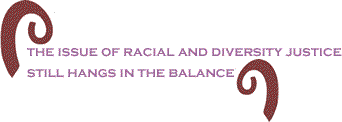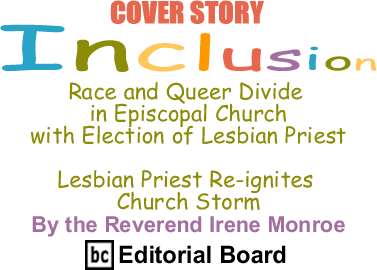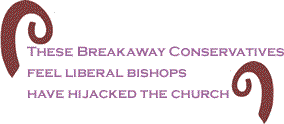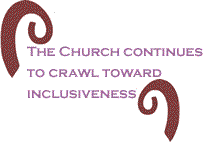
|
||||||||||||||||||||||
|
||||
 |
||||
On
December 5th cheers reverberated across the country with the news
that at the 114th annual convention of the Episcopal Diocese of
Los Angeles two women were elected as bishops- Rev. Diane Jardine
Bruce of
If
both women are approved by a majority of bishops their elections
will signal that the But
for many Episcopalians of color the issue of racial and diversity
justice still hangs in the balance as many of their urban ethnic
churches struggle to survive. With nearly one-half of �There
was this feeling that once an Anglo woman had been elected Friday,
maybe we should support a Latino candidate,� said the Rev. Brad
Karelius, one of the senior priests of the The
election for bishop suffragan of the Diocese of Los Angeles was
a fiercely close race between Glasspool and the Rev. Irineo Martir
Vasquez of Given
the theologically conservative make-up of the laity and Spanish-speaking
congregants of the L.A. Diocese a lot of support went for Vasquez.
According to the Rev. Altagracia Perez, rector of The
issue of diversity in the governance and election of bishops in
the Episcopal Church is of great concern to congregants of color
in light of shifting racial and ethnic demographics in big urban
cities like And with the shifting demographics from white to ethnic groups of color the Episcopal Church, perhaps unintentionally, has chosen to build up one ethnic or minority church over another. And, too often, it feels to many ethnic churches of color that they are always pitted not only among themselves, but also against white queers.
�Those
Latino churches are set up like a 'reservation system' within
the Episcopal Church,� said Juliana Gutierrez, a lesbian Mexican
American who worships in an Episcopal Church in Comprised
primarily of a migrant population from all over I have my own queries for the Episcopal Church, dubbed by many as the �ruling class at prayer,� with respect to its urban churches, including:
A
joint survey by the Pew Hispanic Project and the Pew Forum on
Religion & Public Life reports that the emergence of Latino-oriented
churches are changing the country�s religious landscape not only
in the Catholic Church but also in the The survey also reports, �While the prevalence of Hispanic-oriented worship is higher among the foreign born, with 77% saying they attend churches with those characteristics, the phenomenon is also widespread among the native born, with 48% saying they attend ethnic churches.� The L.A. Diocese began its outreach ministry in the 1940�s to Latino immigrants. Queer Latino Episcopalians like Gutierrez feel tore in a church that has elected either white queer or Latino heterosexual bishops. Glasspool
is fluent in Spanish, has served in urban cities across the country
and is not a single-issue cleric. She told a reporter at the annual
convention that the church is ready to go beyond � �superficial
characteristics and boxes in which we put people, to really look
at individual people and assess the needs of the diocese and pair
them with the gifts and skills that Diane and I each bring. However, for Gutierrez the post-racial revolution hasn�t come. Gutierrez wants to see more Latinos in church leadership roles because race still matters. Rev. Irene Monroe Since the 2003 consecration of the Bishop V. Gene Robinson of New Hampshire, the church�s first openly gay bishop, that set off a worldwide firestorm of reactions, both positive and negative, the recent election of an openly lesbian candidate, the Rev. Mary Douglas Glasspool of Baltimore, as bishop suffragan of the Diocese of Los Angeles will re-ignite the storm once again. And her election hangs in the balance. Under the canons of the Episcopal Church a majority of bishops must consent to Glasspool�s ordination for the selection process to be complete.
Glasspool�s election has already brought immediate concerns to the Archbishop of Canterbury Rowan Williams. Issuing a cautionary statement in response to the Diocese of Los Angeles' election of Glasspool Williams stated the following:
Although Williams denounces anti-gay prejudice in the church Glasspool�s election is the prism through which we see the Episcopal Church�s long-time struggle and history with homosexuality. Williams candidly told the Episcopal News Service �changing the Anglican theological position on homosexuality would have to be based on the most painstaking biblical exegesis and on a wide acceptance of the results within the Communion.� And that acceptance won�t come easy. Since Robinson�s consecration, the Anglican Communion Network (ACN), also known as the �Breakaway Conservatives, is a theologically conservative network of dioceses and parishes that has been working toward a realignment in U.S. Episcopal Church. These Breakaway Conservatives feel liberal bishops have hijacked the church by both �accommodate[ing] and incorporate[ing] un-Biblical, un-Anglican practices and teaching.�
In the 1970s, the argument for authority of Scripture came up with the ordination of women � and so, too, did the threat of a schism. But in 1989, the Church consecrated its first female bishop � Barbara C. Harris. And conservatives were not only theologically outraged, but also racially challenged because Harris is African American. And in 2006, gasps of both exhilaration and exasperation reverberated throughout the Anglican Communion when it was announced that Katharine Jefferts Schori would be the Presiding Bishop of the Episcopal Church USA. Schori not only supports gay unions, but she also backed the holy consecration of Robinson. All this is no surprise, however, since the Episcopal Church has a history of taking the moral high ground on social justice issues. On the theological rift concerning American slavery, the Episcopal Church rebuked the Bible�s literal interpretation, arguing that slavery violated the spirit of the Bible. The
Emmanuel Episcopal Church in The Episcopal Church prides itself as being an inclusive worshiping body. And it is drumming up a new national ads campaigns stating �The Episcopal Church Welcomes You� with specific examples of the Church�s beliefs.
With the changing demographics, both nationally and globally, of this ecclesial body, the Church�s once-upon-a-time ruling �Frozen Chosen,� whose anti-gay initiatives had a stranglehold on the Church�s governing future is beginning to wane. While many LGBTQ Episcopalians and their allies are jumping for joy over Glasspool�s election the battle isn�t over. For me, however, the joy in this moment in the history of the Episcopal Church is that the Church continues to crawls toward inclusiveness, albeit haltingly and in spite of opposition. And for those of us on the margins in our churches and faith communities, Harris, Robinson, Jefferts Schori and now Glasspool show us the church�s steadfast principle of justice in action. BlackCommentator.com Editorial Board member, the Rev. Irene Monroe, is a religion columnist,
theologian, and public speaker. A native of Brooklyn, Rev. Monroe
is a graduate from Wellesley College and Union Theological Seminary
at Columbia University, and served as a pastor at an African-American
church before coming to Harvard Divinity School for her doctorate
as a Ford Fellow. She was recently named to MSNBC�s list of 10 Black Women You Should Know. Reverend Monroe is
the author of Let Your Light Shine Like a Rainbow Always: Meditations on Bible
Prayers for Not-So-Everyday Moments |
||||
 |
||||
If you would like to comment on this article, please do so below. There is a 400 character limit. You do not need a FaceBook account. Your comment will be posted here on BC instantly. Thanks. Entering your email address is not mandatory. You may also choose to enter only your first name and your location.
|
||||
Thank you very much for your readership. |
||||
| Any BlackCommentator.com article may be re-printed so long as it is re-printed in its entirety and full credit given to the author and www.BlackCommentator.com. If the re-print is on the Internet we additionally request a link back to the original piece on our Website. | ||||
| |
||||
| December 10 , 2009 Issue 354 |
| Executive Editor: Bill Fletcher, Jr. |
| Managing Editor: Nancy Littlefield |
| Publisher: Peter Gamble |
| Est. April 5, 2002 |
| Printer Friendly Version in resizeable plain text format |
 |
 |

|
 |
| |
| |

































 For
example, the unresponsiveness to dying black urban churches is
emblematic of the Episcopal Church's ineptitude to grapple with
the ways that racism and classism choke not only the spiritual
life out of a church but its monetary life as well. With the Episcopal
Church's urban landscape changing, the denomination has opted
to pour its support, money, and energy not into these historic
black churches but instead into developing urban Latino churches.
The gentrification of the urban church by replacing one minority
group with another sets up a paradigm of �divide and conquer�
that makes neither group feel welcomed, but both expendable.
For
example, the unresponsiveness to dying black urban churches is
emblematic of the Episcopal Church's ineptitude to grapple with
the ways that racism and classism choke not only the spiritual
life out of a church but its monetary life as well. With the Episcopal
Church's urban landscape changing, the denomination has opted
to pour its support, money, and energy not into these historic
black churches but instead into developing urban Latino churches.
The gentrification of the urban church by replacing one minority
group with another sets up a paradigm of �divide and conquer�
that makes neither group feel welcomed, but both expendable.
 A
graduate of Episcopal Divinity School in
A
graduate of Episcopal Divinity School in  But
�authority of Scripture� doesn�t hold weight in the argument against
homosexuality because the Episcopal Church has always challenged
controversial issues of the day.
But
�authority of Scripture� doesn�t hold weight in the argument against
homosexuality because the Episcopal Church has always challenged
controversial issues of the day. �We
want to herald and share our welcoming message,� explained Anne
Rudig, Episcopal Church Director of Communication told the Episcopal
News Service. �We are bringing our identity, our core beliefs,
and our heritage to life in a manner that invites all to share.�
�We
want to herald and share our welcoming message,� explained Anne
Rudig, Episcopal Church Director of Communication told the Episcopal
News Service. �We are bringing our identity, our core beliefs,
and our heritage to life in a manner that invites all to share.�










